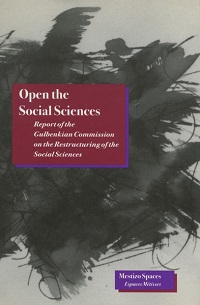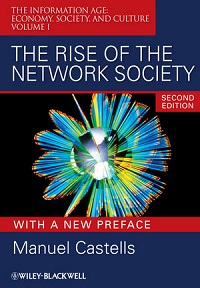“Social science is an enterprise of the modern world.”
So begins the 1996 Report of the Gulbenkian Commission on the Restructuring of the Social Sciences.1 Redwood City: Stanford University Press, 1996More info → Though hardly controversial, this statement nonetheless has vital implications. Beginning with the noncontentious, social science inevitably reflects the nature of the society in which it exists. Since the hallmark of modernity is incessant change, it follows that social science has always had the potential to be an exceptionally vibrant and dynamic corner of knowledge reflecting social differences in time and space.
Redwood City: Stanford University Press, 1996More info → Though hardly controversial, this statement nonetheless has vital implications. Beginning with the noncontentious, social science inevitably reflects the nature of the society in which it exists. Since the hallmark of modernity is incessant change, it follows that social science has always had the potential to be an exceptionally vibrant and dynamic corner of knowledge reflecting social differences in time and space.
The story the commission tells is that of a “new science” emerging through the nineteenth century from which it inherited the myth of progress and reification of the (nation-) state. Building on these basics, social science was soon firmly disciplined—largely under American leadership. By the mid-twentieth century just three disciplines—sociology, economics, and political science—dominated social science, providing knowledge to understand the developments of national societies, national economies, and national politics. It was the breakdown of this simple triple edifice—partly reflected in the growing popularity for pursuing multi-, inter-, or trans-disciplinary approaches—that concerned the commission in its search for a more variegated social knowledge. The rise of globalization practice and discourse was an important component of this putative restructuring, as the main disciplines were critiqued as inherently state-centric.
“So has social science finally attained its dynamic potential?”Twenty years on, and with globalization and our understanding of it continuing to evolve, this essay explores a current means of organizing social knowledge quite distinct from past disciplining. Indeed, the erosion of disciplines has continued (they remain largely to certify knowledge workers), and a more vibrant social science has emerged reflected in the multiplication of specialist academic journals, research centers, and conferences in a wide range of new study areas. So has social science finally attained its dynamic potential? I will argue not so. A different social science is emerging that reflects our contemporary society dominated by corporate globalization. It is this “corporate social science” that is my subject matter and which I will compare to “university social science,” variably disciplined over the last century.
Before defining corporate social science I need to say something about corporate globalization. The literatures both lauding and criticizing contemporary globalization have generally labeled it “neoliberal.” This describes the key process in generating globalization: the move from state provisioning to market provisioning, both nationally and internationally, that started in the last quarter of the twentieth century. Reaganomics and Thatcherism in the erstwhile “first world” combined with the collapse of command economies in the erstwhile “second world” alongside IMF dictums in the erstwhile “third world” equals “one world,” and, ipso facto, globalization.
“This is corporate globalization, and a capturing of social science is another of its manifestations.”I think the time has come to start labeling globalization by its key outcome: the global power shift to myriad large corporations. And their combined influence goes way beyond their economic practices and prowess. To be sure their power is widely contested, but they have come to define our society worldwide through, for instance, political lobbying and cultural sponsoring. This is corporate globalization, and a capturing of social science is another of its manifestations.
Corporate social science is the combined knowledge output on contemporary social relations by self-styled policy think tanks, the research arms of advanced producer service corporations, supplemented by publications by UN institutions and other global players such as NGOs. I am using the label “corporate” in a broad sense—not all the knowledge producers are actually private corporations, but they are all imbued by a particular research ethos that has been diffused through corporate globalization. The output consists largely of expert reports, each presented with the knowledge producer’s “brand” prominently displayed through its bespoke logo. To be sure, there is variety among these social knowledge producers, but they are all very much creatures of our global times. The resulting research is by no means a mere byproduct of a corporation’s or institution’s more important “core activities”; reports are typically based upon the work of numerous internal researchers, sometimes with external expertise bought in. In other words, they are buying into what Manuel Castells calls “global informational society” as a necessary part of their being.2
 See Castells’ series, The Information Age.
See Castells’ series, The Information Age.
More info →
Let me illustrate using my own research field: urban studies. Cities have become an important topic in corporate social science. There are many think tanks that have moved into or expanded urban research programs (e.g., Brookings Institution); there are new think tanks specifically established to monitor cities (e.g., Chicago Council on Global Affairs’ Forum on Cities), there are numerous programs of work on cities for clients by realtors (e.g., Grosvenor, Jones Lang LaSalle), financial service firms (e.g., HSBC, Master Card), management consultants (e.g., McKinsey, A.T. Kearney), and accountancy firms (e.g., KPMG, PwC), all supplemented by myriad urban studies from UN institutions (e.g., World Bank, UN-Habitat), and brought together at large city conferences each sponsored by dozens of corporations (e.g., in Abu Dhabi, Sydney). This suite of work produces publications that constitute a body of knowledge on cities probably at least as large as that of all urban research in universities; the World Bank website alone features over 2,300 research reports. And, of course, corporate urban studies are just a small part of corporate social science.
“There are three interrelated, crucial differences: knowledge validation, knowledge purpose, and knowledge dissemination.”How does corporate social science differ from the corpus of research coming out of universities that we normally recognize as social science? The first point to make is that the quality of the researchers will be on a par, both groups being the product of universities’ certification function. And there is interweaving between the two social sciences with, for example, corporations funding or sponsoring research in universities. But there are three interrelated, crucial differences: knowledge validation, knowledge purpose, and knowledge dissemination.
Means of validation are starkly different. In university social science there is blind peer review for knowledge contributions to academic journals, the key vehicle for dissemination. Typically a submitted paper must satisfy three reviewers and an editor that the research is properly conceived in relation to previous similar studies, that its data is correctly collected and checked, that the analysis is appropriate and relevant, and that the results are reasonably interpreted. This vetting is a quality control mechanism that has worked for about a hundred years; it is not foolproof—bad papers sometimes pass—but overall it operates very well to ensure production of credible social science.
The purpose of all this is represented by the long shelves of journal annual volumes that constitute evolving bodies of certified social knowledge. In contrast, the standard product of corporate social science are reports, and their validation is much more variable, sometimes in-house, sometimes using outside people but there is no equivalent overall quality control mechanism.
Knowledge dissemination is also very different: the work is distributed first to clients (private and public) although it is sometimes made more widely available on websites. And this all relates to the distinct purpose of the research so that the ultimate mechanism of control is the market; dissemination is crucially to clients, do they like the knowledge product? Of course, this is social research linked to corporate promotion; certainly corporate social science publications are much more glitzy than academic journals!
“How does this relate to the nature of the knowledge being produced?”How does this relate to the nature of the knowledge being produced? Certainly this is not a matter of objective versus subjective approaches; all meaningful validation is about intersubjectivity—the research findings must be replicable. Neither is it a difference between pure and applied knowledge. Of course corporate social science is more overt in proclaiming its usefulness, but all social science aspires to be relevant in some sense, even if only indirectly. But there is a clear difference in output as indexed by the reference lists of academic articles and corporate reports. They both tend to cross-reference within their respective realms: journal editors expect their authors to refer to numerous other journal articles, whereas reports often focus much more on citing other reports. In fact this is one way in which to confirm the existence of two distinctive social sciences.
I have on my desk before me a report for a UN organization by a competent think tank (it boasts over thirty authors) on “the transformative power of cities” that has no references to any research in the main academic journals in this field.3For example, City, Cities, International Journal of Urban Science, Journal of Urban Affairs, Journal of Urban and Regional Research, Journal of Urban Economics, Regional Science and Urban Economics, Urban Geography, or Urban Studies. Instead, of the thirty-six references listed, two are of its own previous reports, another two are a report and a research paper from two other think tanks, one report from a trade association, another from an accountancy firm, plus seventeen publications from ten different UN institutions, and four from national government institutions. (The remaining nine references are to books and academic articles, but of these only one book is about cities.) Clearly here we have two very different knowledge worlds. It appears that the social science research done in universities, and vetted so assiduously by journal editors, hardly exists in corporate social science.
“Social science has come rather late to corporate research.”But the key point is that the meaning of research in the two social sciences is essentially different. Social science has come rather late to corporate research; in health and environmental sciences corporations either do much of the research directly or sponsor research to meet their specific needs. Such research is often necessarily opaque (market confidentiality), and this has led to some doubtful practices in health sciences and downright distortions in environmental sciences. But such problems are likely to be even more prevalent in corporate social science because this knowledge production is subject to a “double hermeneutic”: as the research practice affects the objects of study, the latter are simultaneously subjects that can find their own meaning in the research and can react to alter the findings.
Thus corporate social science is ultimately researching corporate globalization. Obviously it is going to be supportive rather than critical. Consequently, studies of global cities by business service firms do not challenge the role of these major cities; rather they promote a competitive city agenda through which they might offer their services to aid cities in climbing the “world city hierarchy.” Such practice does not only betray the possibility of a critical contribution, it all but eliminates curiosity without which research is sterile: unexpected findings—surprises—are bad because they disrupt given agendas. This is a vital indictment of corporate social science; whether or how it responds—facing this indictment as a challenge—will be crucial for the credibility of future social science.
So where does all this lead? Two points have to be made clear. First, philanthropic foundations, often carrying corporate names, that have been important funders of social science research over the last century or so are not the same as today’s corporate social science; they have had a crucial input into university social science. Second, we should not think that university social science is immune from the corporate globalization that currently envelops it. With enhanced concern for relevance, impact, and “value for money,” both state and foundation funding institutions have come to judge applications for support particularly on “outcomes” even though the research has yet to take place.
University social science cannot buck the trends set forth by corporate globalization. While it could contest them within a broader societal challenge, for the moment at least, universities are part of corporate globalization, and we can expect many of the features addressed above will continue and grow. Most importantly the balance between the current two social sciences is very likely to move decisively in favor of corporate social science in terms of funding and therefore in personnel and overall output. We have to face the possibility that the nineteenth-century German model of the modern university—combining advanced teaching with the latest research in specialist (disciplinary) departments—is coming to an end: corporate social science is the future.
“I wonder now if, twenty years later, such optimism is warranted.” Returning to the Gulbenkian Commission report, the concluding arguments noted the specific challenge for social science in Africa due to its lack of a dense higher education infrastructure. The report took an optimistic view that this organizational void could be filled by a new framework of autonomous research institutions as a positive contribution to the restructuring of the social sciences. And, being independent of universities wherein disciplines flourish, the new social research on Africa would be strongly interdisciplinary. I wonder now if, twenty years later, such optimism is warranted. There and elsewhere, the rapid growth of non-university-based research has tended toward the corporate social science model.
More broadly, and contra-Gulbenkian, the autonomous nature of social knowledge production is everywhere threatened. What role will universities and philanthropic foundations have in such a scenario? Despite a relative decline in their contributions to social knowledge production, they can carve out a vital position as the crucial vetting agents for social science research. Jointly organized they can strategically deploy their long-term expertise in evaluating funded research projects and doctoral research dissertations to certify the quality of corporate social science research outputs globally. A highly ranked think tank would never want to risk its global reputation by publishing a poorly researched report. Using innovative evaluation practices, its prestige might even require encouragement of curiosity and a cherishing of surprises.













